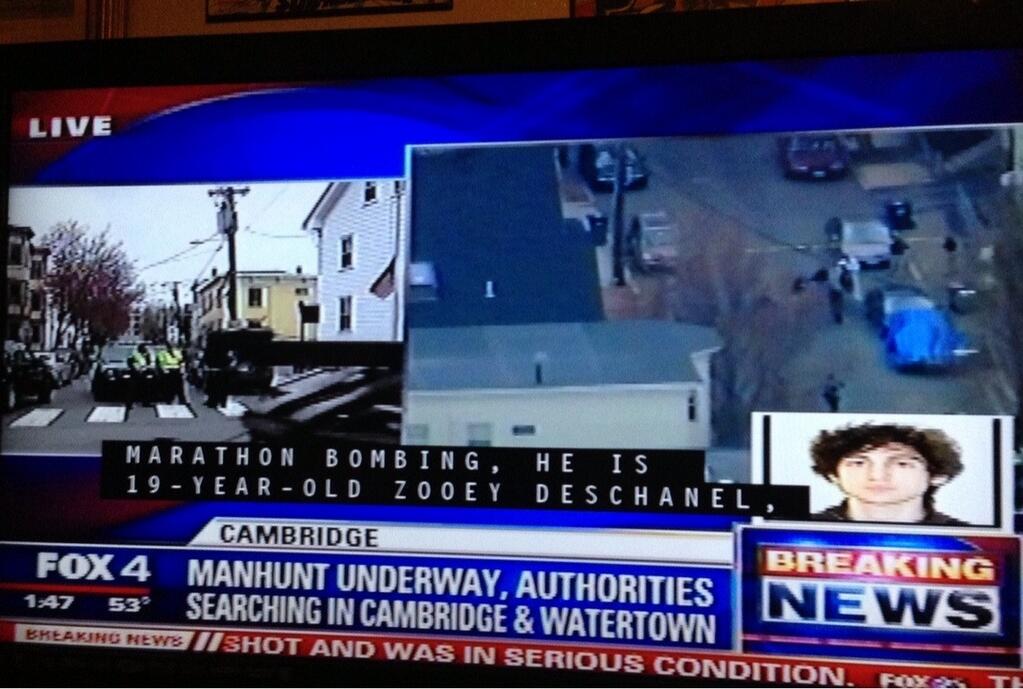Cupertino of the year (?)
« previous post | next post »
Alex Baumans asks, "Could this be a Cupertino?" Liz Rafferty, "Oops! Zooey Deschanel Captioned as Boston Marathon Bombing Suspect", TV Guide 4/21/2013:
Who's that girl? It's … the Boston Marathon bomber?
During the intense lockdown and manhunt for the Boston Marathon bombing suspects Friday, a local Fox affiliate in Dallas, Texas misidentified one of the suspects as none other than New Girl star Zooey Deschanel. The closed-captioning error came as the station was attempting to name Dzhokhar Tsarnaev, the second suspect in the attack who was being hunted by police on Friday.
"He is 19-year-old Zooey Deschanel," the caption faux pas read.
Here's a screen shot:
It certainly seems like some sort of autocorrection gone wrong — it's likely that this is the result of automatic reconstruction of real-time transcription, either this kind or this kind.

Jeff Carney said,
April 21, 2013 @ 5:31 pm
When I first saw that on twitter, I thought it was a very good Photoshop trick. But "autocorrection gone wrong" makes a lot of sense with these too names.
Fraser said,
April 21, 2013 @ 5:40 pm
Actually, I never trusted Zooey Deschanel. I'm not going to rush to any judgement.
Kevin said,
April 21, 2013 @ 6:02 pm
Captioning live news broadcasts, especially by local channels, often seems sketchy. These two names seem vaguely close by sound, such that a "best guess" based on phonetics might spit out ZooeyDeschanel rather than DzhokharTsarnaev. Especially if the news reader was pronouncing Dzho more as 'zo' than 'jo'.
(That said, by midafternoon Friday I would have expected transcribers to have expanded their dictionary to include this new name.)
Mr Punch said,
April 22, 2013 @ 7:56 am
There's a fine line between "adorably wacky" and "completely nuts."
Arun said,
April 22, 2013 @ 11:33 am
As someone who has worked in the field, it takes some fairly quick thinking on your part when it comes to voice writing. After the first mistake (or two), I'm sure the captioner would have inserted it in via their keyboard.
The program used by my old company required constant re-tuning of each user's profile so that it could update itself to new words/sound combinations and shortcut macros and such.
Keith said,
April 22, 2013 @ 5:17 pm
Broadcasters in the US are so completely incapable of pronouncing a name that is not that of a well known Hollywood actress that this kind of mistransliteration does not surprise me in the least.
Were those "newscasters" even born when Dzhokhar Dudaev's name was so famous?
Maybe born, but asleep, as they seem to be even now…
Paul Mulshine said,
April 23, 2013 @ 9:32 am
On the subject of broadcasters not knowing how to pronounce names: In the early days of the John Edwards/Rielle Hunter scandal, someone at the Associated Press who apparently never learned phonics put out what he thought was the pronunciation of her first name: "Riley." It is, of course, REE-elle, but the broadcasters of America dutifully repeated the error.
Faldone said,
April 23, 2013 @ 10:36 am
Then there was the confusion that resulted when it was announced that Kim Kashkashian had won a Grammy for best classical instrument solo.
Thomas Hancock said,
April 23, 2013 @ 4:13 pm
I ran across this one while editing. A mere change to a capital letter results in a grisly discovery of human trafficking.
Original text: "Make up as many baby afghans as you can afford and put away a few for gifts."
MS Word-Suggestions: "Afghans"
Kevin said,
April 27, 2013 @ 6:20 pm
The people who do closed captions in realtime use the same stenographic writers that court stenographers use, depressing several alphabetic keys at the same time in composing new words, syllable by syllable.
The /zo/ in 'Zooey' is produced on the writer by pushing down both top and bottom rows of keys on the left hand side of the machine; the 'Joe' in 'Dzho-kar' is produced by only pushing down the lower row on the left side. The zo/jo was a slip of the fingers.
As for the 'cha' in 'Chanel' and 'Tsa' in 'Tsarnaev', a slip of the fingers also likely happened, as the stroke for 'cha' is one off from the stroke for 'Tsa'.
During commercial breaks, these captioners have an opportunity to add new strokes to their realtime captioning software's dictionary and these are often fixed by the time the news program returns from commercial break, which is why the captioning gets better and better as new news breaks.
The software used by these captioners don't auto-correct. Auto-correct might result in f-bombs and the like appearing in the captions (The stroking of the f-bomb is one key off from captioners stroking 'tuck', 'puck', 'knack', 'tack', 'pack', 'knick', 'tick', 'pick', etc., so auto-correct is always turned off). Instead the captioners program their own 'dictionaries' with thousands of disyllabic strokes, and this captioner likely had /zo/-sha programmed into his or her software as shorthand for 'Zooey Deschanel.'
These captioners can 'write' (words, punctuation, noises, newscasters' names) between 260 and 335 words per minute and are held to 97% accuracy or better by the industry.